Houston Astros: Five worst moments in franchise history

We painfully relive the five worst moments in Houston Astros history.
Maybe I’m just a glutton for punishment, but when I ranked the top five moments in Houston Astros history, I figured I also needed to do the five worst. As I compiled my list of the most heartbreaking events, I was having some serious difficulty narrowing it down to just five. But naming the top 10 would be too long, so I narrowed it anyway.
These moments are burned into many of our minds, forever part of our collective baseball consciousness. Many of them changed the course of Astros history, shaping the franchise into what we know today.
These five moments are among those that most Astros fans would list, though we might disagree on the order. There are a few that got left out, so I have some honorable mentions. We have a pair of home runs in the 2005 World Series, one by Scott Podsednik to end Game Two, and one by Geoff Blum to give the White Sox the lead in the 14th inning of Game Three.
Jim Edmonds‘ walk-off homer in Game Six of the 2004 NLCS comes to mind, as does Kendrys Morales‘ go-ahead hit in Game Four of the 2015 ALDS. Finally, we can’t ignore the beaning Dickie Thon took early in 1984 that ended his season and quite possibly altered the trajectory of his career.
Now without further ado, here are the five worst moments in franchise history, recounted in all their painful glory.
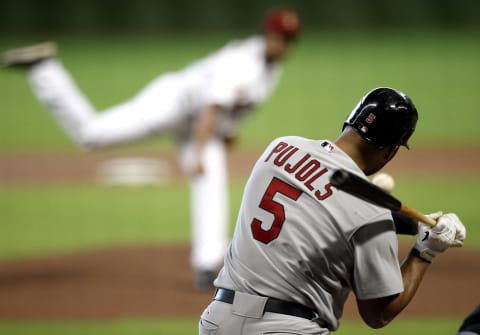
5. Albert Pujols Home Run – 2005 NLCS Game 5
After losing to the Cardinals in the 2004 NLCS, the Astros were looking for some revenge when the teams met again in 2005. They didn’t have Carlos Beltran or Jeff Kent anymore, or a healthy Jeff Bagwell, so the offense wasn’t as potent. But they did have a healthy Andy Pettitte and thus arguably the game’s best starting rotation trio.
They took a 3-1 lead in the series thanks to that stellar pitching and were in a position to close out their first pennant in Game Five in Houston. A three-run homer by Lance Berkman in the seventh gave the team a 4-2 lead, and they brought ace closer Brad Lidge in to shut the door in the ninth. Lidge had earned the save in all three of the team’s wins in the series.
After striking out the first two batters, Lidge gave up a single and a walk to bring up Pujols, who was probably the last person anyone wanted to face in that situation. On an 0-1 count, Lidge hung a slider that Pujols launched over the train tracks to give the Cardinals a 5-4 lead. I still maintain that ball is floating around in space somewhere.
Suddenly, after being just one out away, the Astros were behind and would lose the game. That home run was one of those moments you never forget, as it went from excitement and hope to simple stunned silence in an instant. There was no suspense either — everyone knew it was gone the moment Pujols hit it.
Even though the Astros came back to win Game Six and advance to the World Series, that one homer seemed to have a lasting effect on Lidge. He took two of the team’s four losses in the World Series and had an awful 2006 season. He didn’t seem to fully recover until he was traded to the Phillies.
So even though the home run seemingly only cost the Astros one game, in the end it cost them more than that. They were forced to pitch Roy Oswalt in Game Six instead of having him for Game One of the World Series, and their lights-out closer was never the same. The World Series might have gone quite differently if not for that one swing by Pujols.
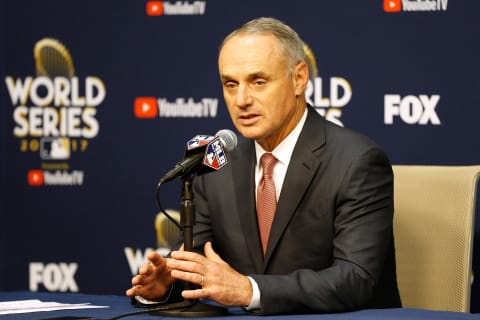
4. MLB’s Sign Stealing Report
Regardless of one’s feelings on this issue — and there are many — there’s no denying this has left a permanent black mark on the organization. I’m not so worried about the haters, because they’ll always be there no matter what happens and are probably enjoying the fact that this all happened.
It’s an awful moment for plenty of other reasons. For one, the Astros lost their manager and GM, both of whom were instrumental in the team’s success since 2015. Jeff Luhnow in particular had shown himself to be one of the most shrewd GMs in the game, routinely outmaneuvering his counterparts.
It cast a permanent shadow on the team’s 2017 World Series title, which will forever be tainted in the eyes of many players and fans. The Astros were talented enough to win without resorting to cheating, which makes it all the more difficult to swallow.
There’s also the penalties they were slapped with, most notably the loss of draft picks. Having a continuous pipeline of young talent is key to maintaining a consistent winner at the major league level, and the disruption of that could really harm this team in the future.
Then there are the image and legacy concerns, not just for the organization, but also for the individual players. Guys like Jose Altuve and Alex Bregman could end up having Hall of Fame caliber numbers when their careers are done, but the baseball writers who do the voting are notoriously sanctimonious. Just look at how many of them refused to vote for Bagwell simply because he was a power hitter in the steroid era.
So this scandal will have effects that last for years, and we won’t really know how far it reaches until all the players have since retired. That could take a couple of decades, and until then, it’s tough to measure just how detrimental this has been to the Astros organization. But there’s no doubt it will hang over us all for quite some time.
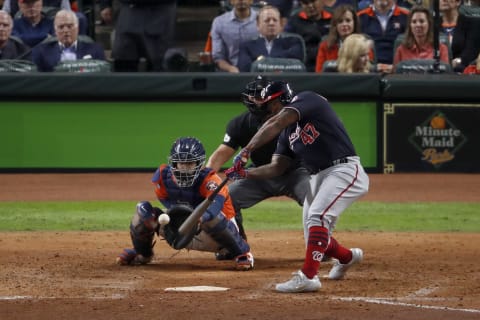
3. Howie Kendrick‘s Home Run – 2019 World Series Game 7
The wound is still fresh on this one, and how the final three innings of this game unfolded will always be a sore spot. As good of a job as Hinch did as Astros manager, there’s no denying he could’ve handled this one much better.
Zack Greinke had cruised through the first six innings as the Astros had a 2-0 lead. He gave up a solo homer to Anthony Rendon with one out in the seventh and then walked Juan Soto, although I still maintain the home plate umpire missed a call in that at-bat. Hinch then went to Will Harris when he should have stuck with Greinke.
On an 0-1 count to Kendrick, Harris located a fastball on the low-outside corner of the plate, which would be a great pitch in most circumstances. But Kendrick managed to hit it just right and bounce it off the right field foul pole to give the Nats a 3-2 lead. The Astros had squandered multiple chances to extend that 2-0 lead, so the Nats going ahead felt like a death knell.
And in the end, it was. Hinch went to Roberto Osuna, who gave up another run in the eighth, before the Nationals put the game away with two more in the ninth. The Astros offense only managed one baserunner in the final three innings, so that home run effectively took all the wind out of their sails.
It was a particularly bitter loss in the World Series considering the Astros won all three games on the road but failed to win a single game at home. It’s never easy to make it to the World Series in the first place, so losing one in such a fashion will always be a bitter pill to swallow.
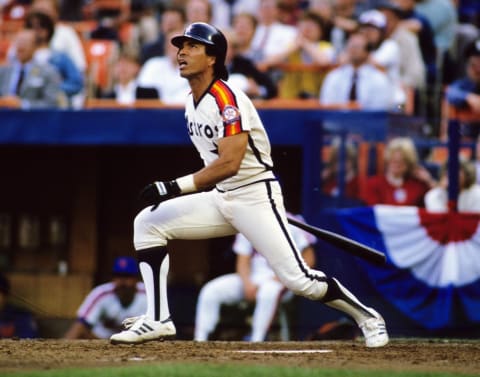
2. Final Out of Game 6 of the 1986 NLCS
This one was about as heartbreaking as it gets. The 1986 Astros were the best team in franchise history up to that point and had captured the NL West behind a Cy Young-winning season from Mike Scott. His dominance continued in the postseason as he won Games One and Four, allowing just one run in 18 total innings.
The Astros trailed the series 3-2 entering Game Six, knowing they had Scott on deck to pitch a potential Game Seven. It was the equivalent to the Astros having Gerrit Cole in 2019 — Scott was the best pitcher on the planet at that time, and it felt like certain victory with him on the mound. They just had to get him there.
Game Six in the Astrodome saw the hometown nine take a 3-0 lead in the first inning and hold that lead until the ninth. Starter Bob Knepper gave up a triple, a single and a double to make it a 3-2 game before he was pulled for closer Dave Smith, who gave up two walks and then a sac fly to tie the game.
The Mets scored in the top of the 14th, but Billy Hatcher homered in the bottom of the inning to tie it up again. The Mets then scored three in the top of the 16th, but the Astros again refused to quit. They pushed two runs across on singles by Hatcher and Glenn Davis, but with the tying run on second, Kevin Bass struck out to end the game.
It ended what could have been a dream season for the Astros, and it was especially heartbreaking knowing they could have won Game Seven with Scott on the mound. The Mets would go on to defeat the Red Sox in the World Series, making you really wonder what could have been.
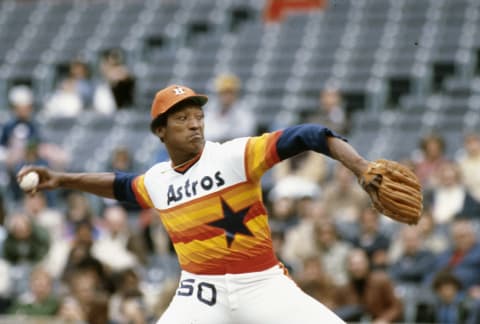
1. J.R. Richard‘s stroke
This moment could very well have changed the course of Astros history more than any other. Richard had become one of the most dominating and fearsome pitchers in the game in the late 1970s, putting up back-to-back 300 strikeout seasons in 1978 and 1979, the latter of which set a record that held until Cole broke it in 2019.
Richard was in the midst of his best season in 1980, making his first All-Star team and being part of a stellar rotation that included Joe Niekro, Ken Forsch, Vern Ruhle and the newly-signed Nolan Ryan. In his 17 starts that year, Richard went 10-4 with a 1.90 ERA, allowing a microscopic 5.1 hits per nine innings. Then tragedy struck.
More from Climbing Tal's Hill
- Just how much better is the Houston Astros playoff rotation than the rest?
- Houston Astros: A Lineup Change to Spark Offense
- Astros prospect Hunter Brown throws 6 shutout innings in debut
- Always faithful Astros World Series champion Josh Reddick defends the title
- Michael Conforto declines Astros’ 2-year, $30 million offer
While warming up for a game on July 30, Richard collapsed due to a stroke caused by a blood clot. Though he thankfully survived, he never pitched in the majors again, as his comeback attempt was marred by blurred vision and slowed reflexes. Perhaps if the Astros had taken Richard’s concerns seriously when he removed himself from a start on July 14 due to arm numbness, this could have been avoided.
The team would go on to win its first division title that season, but lost in the NLCS. One has to wonder if the result would’ve been different if they had Richard on the mound, and the same can be said for subsequent seasons. With any luck, he could’ve been part of that 1986 team as well. At the rate he was going, he could’ve had a shot at a Hall of Fame career.
His life story is amazing, as Richard found himself homeless and living under a Houston overpass at one point after his career. He’s since recovered, becoming a minister and coach and working with several charities. He’s also part of the Astros Hall of Fame, which he more than deserves. Richard was arguably the best pitcher to ever play for the team, and his stroke cut short a career that could’ve been one of the greatest of all time.